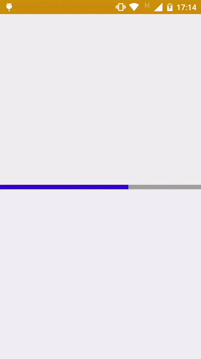6
I’m trying to implement a smooth animation in my ProgressBar, but, if I increase the duration time, the animation stops being "smooth".
Example with 5 seconds:

Example with 30 seconds:

ProgressBar background:
<layer-list xmlns:android="http://schemas.android.com/apk/res/android">
<item>
<shape>
<padding android:top="1dp" />
<solid android:color="#10444444" />
</shape>
</item>
<item>
<shape>
<padding android:top="1dp" />
<solid android:color="#20444444" />
</shape>
</item>
<item>
<shape>
<padding android:top="1dp" />
<solid android:color="#30444444" />
</shape>
</item>
<item android:id="@android:id/background">
<shape>
<solid android:color="@color/black_thirty" />
</shape>
</item>
<item android:id="@android:id/progress">
<clip>
<shape>
<solid android:color="#3500D0" />
</shape>
</clip>
</item>
</layer-list>
Layout of ProgressBar:
<ProgressBar
android:id="@+id/pb_loading"
android:layout_width="match_parent"
android:layout_height="8dp"
android:indeterminate="false"
android:layout_centerInParent="true"
android:progress="100"
android:progressDrawable="@drawable/my_progress_bar" />
My method of animation:
private void startAnimation(){
ProgressBar mProgressBar = (ProgressBar) findViewById(R.id.pb_loading);
ObjectAnimator progressAnimator = ObjectAnimator.ofInt(mProgressBar, "progress", 100, 0);
progressAnimator.setDuration(30000);
progressAnimator.setInterpolator(new LinearInterpolator());
progressAnimator.start();
}
The attribute
android:maxwas the key! I had tried only withandroid:progress="1000". Thank you very much– rsicarelli